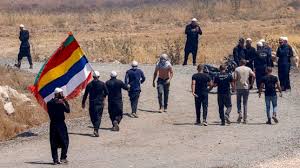
In Israel, the Druze community occupies a complex position: celebrated as loyal citizens by the state, yet subject to systemic inequalities that have persisted since the 1950s. Their story has returned to the spotlight amid speculation about Israel’s intentions toward Syria’s Druze-majority Suweida province — a prospect that analysts say is unlikely, but revealing of deeper regional dynamics.
A Minority with a Special Status — and Special Burdens
Israel’s Druze population, roughly 150,000 people — less than 2% of the population — is split between those from the occupied Syrian Golan Heights and those from the Galilee in northern Israel. Since 1956, Druze men have been subject to compulsory military service, a requirement not imposed on other Arab citizens. Many have risen to senior ranks, yet despite the official rhetoric of loyalty and inclusion, they remain largely excluded from key command positions and sensitive decision-making roles.
Critics within the community point to a pattern of symbolic recognition masking a reality of “concealed discrimination.” Druze towns — none of which have municipal status as cities — lag behind Jewish localities in services and infrastructure. Significant tracts of Druze agricultural land have been confiscated over decades under the pretexts of “emergency needs,” “public benefit,” or “security requirements.” Studies estimate that up to 64% of Druze lands have been expropriated. Expansion is constrained by military zones and nature reserves, forcing residents into illegal building subject to demolition.
The 2018 Nation-State Law, which enshrined Israel as the national homeland of the Jewish people alone, marked a turning point. Senior retired Druze officers and political figures openly protested, declaring that the law relegated them to second-class status.
The Suweida Question
Against this backdrop, some have wondered whether Israel might move to incorporate Suweida, a Syrian province where Druze communities have endured years of economic collapse, lawlessness, and feelings of abandonment — particularly since Islamic State attacks in 2018. Israel has offered limited symbolic and, at times, security support, presenting itself as a potential protector.
But outright annexation is considered improbable. Bringing in Suweida’s estimated 700,000 residents would dramatically alter Israel’s demographics and create major political, security, and social challenges. New arrivals would not be granted citizenship, effectively creating a densely populated enclave under indefinite control — a scenario Israel has sought to avoid elsewhere.
A Buffer, Not a Prize
Analysts say Israel’s strategic interest lies in maintaining Suweida as a buffer zone rather than absorbing it. Such an area could be marketed under labels like “autonomous region,” “decentralised zone,” or “protected area,” with limited security or humanitarian aid and quiet coordination with local leaders. The model, critics argue, would resemble the South Lebanon Army’s role under Israeli patronage in southern Lebanon from 1982 to 2000: a local force serving as a line of defence without integration into the state.
The Druze Dilemma
For Suweida’s Druze, this “protection” might initially bring improved security and some form of local governance. Yet without economic prospects or formal political status, they risk becoming the biggest losers: cut off from Damascus, denied Israeli citizenship, and isolated from the wider Arab sphere, which could brand such an arrangement as betrayal.
The outcome, observers warn, could be a “border society” — trapped between jurisdictions, economically stagnant, politically marginalised, and used as a bargaining chip until deemed expendable. Historical precedents include the Sahrawi camps in Tindouf, Algeria; the South Lebanon Army in the 1980s-90s; Tamil border enclaves in Sri Lanka; the Rohingya on the Myanmar–Bangladesh frontier; and, more recently, opposition-held enclaves in northern Syria under Turkish oversight.
Paths Forward
No easy solutions exist. The least damaging course, say community leaders, is to strengthen local administration capable of maintaining security and providing basic services, drawing on diaspora support, while affirming Syrian national belonging — without aligning with the Assad regime’s security apparatus. The emphasis, they argue, must shift from sectarian rhetoric to citizenship-based discourse, offering a model of governance the central state has failed to deliver.
Symbolic gestures, such as flying Israeli flags in protests, should be understood as expressions of despair rather than genuine calls for annexation. For Damascus, the challenge — and responsibility — is to respond with credible inclusion, justice, and dialogue, avoiding narratives that frame the Druze as adversaries.
If Suweida were ever lost through annexation or “protection” arrangements, analysts say, the blame would fall not on the Druze but on state intransigence and failure to act when it mattered most.
